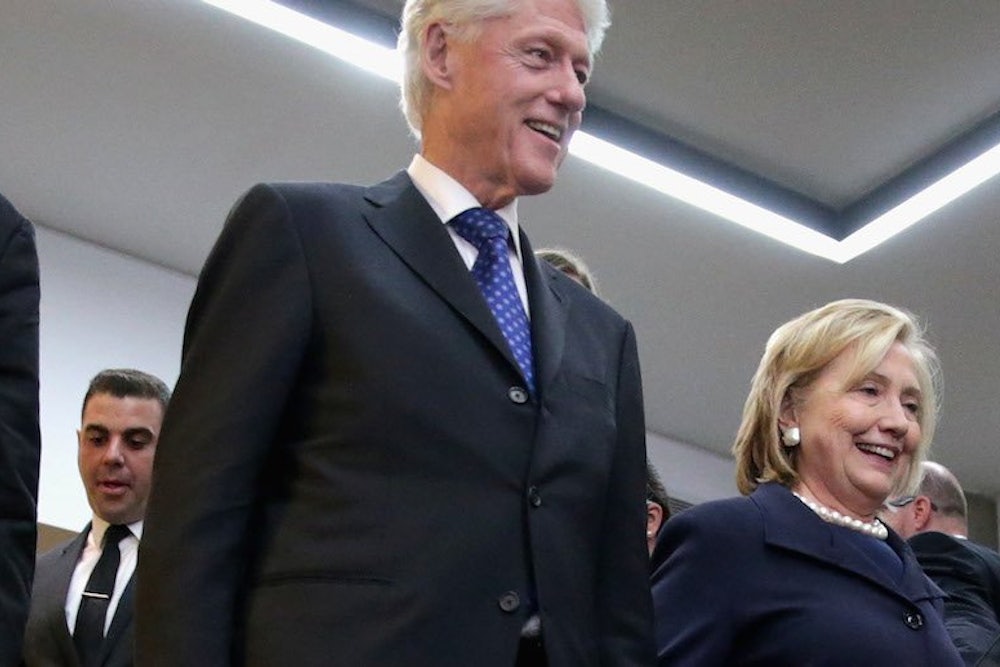Amy Chozick's big cover story in The New York Times Magazine, which is unfortunately accompanied by the weirdest and worst cover art in magazine history (I exaggerate only a little), is yet another piece about the people in the Clintons's orbit, and what they will mean when Hillary decides should Hillary decide to run in 2016. The piece seems to be operating on two levels, which I can't call text and subtext because they are both right there. But what they prove is that Clintonland, where insecurity seems to be the overriding emotion, is just like high school.
Chozick's story starts out worryingly. It seems that Clinton now goes around giving speeches ("leadership is a team sport"), making money and going to parties. Chozick writes:
Through it all, the former first lady/secretary of state/likely Democratic candidate for president seemed gracious and untroubled, and yet it was hard not to feel an enjoy-it-while-it-lasts sort of sympathy for Clinton. She had, after all, spent four years at the State Department displaying great political and diplomatic and managerial skill, and in that process shed much of the baggage generally associated with the Clintons. Yet that very organizational meshugas already threatened, once again, to entangle her.
This whole paragraph is written as if Hillary Clinton is being forced to give $200,000 speeches and hang out with Jeffrey Katzenberg. But who created this threatening "organizational meshugas" if not her and Bill? Which reminds me: Has anyone been written about in more passive terms (see above) than Hillary Clinton? She was screwed over by Bill; Rick Lazio "invaded her space"; Obama was rude to her at a debate; Mark Penn did damage to her campaign; she was let down by other advisors. The poor woman just can't catch a break.
Anyway, Chozick soon recovers from this shaky start, and gets to the first main argument of her story: the Clintons are people who inspire loyalty in their followers.
One former aide told me that working for the Clintons is like staying at the Hotel California (“You can check out, but you can never leave”); another person compared it to prison (“Not everyone can adjust to life on the outside”). Others compared it to a marriage, one as complicated and built on blind loyalty as Bill and Hillary’s own.
And:
When Clinton accepted the job as secretary of state, she did so with the understanding that she could bring some of her most loyal people — called the Royal Council by one aide — along with her. (“Obama didn’t realize that extended to the cafeteria workers,” quipped one person familiar with the confirmation process.)
And:
Together, the combined forces of [two Clinton advisors] project a tightly knit, loyal-till-death image that’s already reflected in Clinton’s personal staff.
Okay, we get it: politics can be like family; the Clintons are caring people who look after their staff; to paraphrase Hillary, campaigning is a team sport. And yet the second strand of Chozick's story is that all these people are politically unsavory and dangerous to Hillary Clinton's 2016 dreams, and cannot at all be trusted! So it's sort of like a family with nothing but black sheep.
The first amusing tidbit along these lines comes from Harold Ickes, the longtime Clinton loyalist:
When I asked Ickes why, as an obsessive diarist, he hadn’t written a memoir after he was fired as deputy chief of staff in 1997, he cited loyalty. “As hard as it may be to imagine,” Ickes told me, “there are people who feel loyal to the person they’re serving.” Then he offered a more revealing answer. “The Clintons are still major players in the national political scene, and even if people were inclined to write a book — and I’ve never been inclined that way — they [have to] think the Clintons have a big reach and continue to influence the Democratic Party. Why do I need to get on the wrong side of them?”
Ickes must have somehow forgotten that he is a machine programmed to spout pro-Clinton propaganda, because this is not nice at all. It's also a bit sad: You slave away for people hoping that they love you back and yet...you are actually still scared of them. But Ickes's concern is the least of it. Everyone in Clintonland seems either scared of the Clintons, in their own trouble and thus at risk of dragging Bill and Hillary down, or squabbling with other members of the "family." Lanny Davis is nervous about talking and needs permission from a Clinton enforcer; Betsey Wright has been cut loose after getting into trouble in Arkansas; Doug Band is on Chelsea's shit list. Pretty soon, the hangers-on are referred to as "claqueurs" by Chozick, who details the attempts of Bill and Hillary to keep their ostensible friends away from them. The loyalty, at least in terms of top-down loyalty, extends only so long as the former First Couple thinks it is in their interest. So it isn't really loyalty.
By the end of the piece, it really did feel like I had just read about high school: The popular kids vacuum up all the "friends" and hangers-on as space will allow; and then they discard them as necessary. It would be silly to think politics was ever about anything else. But you'd think that all these years after the prom, the other kids would have figured that the King and Queen don't actually care about them.
